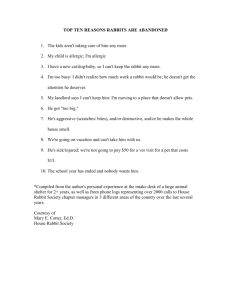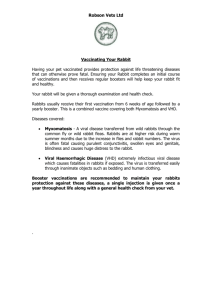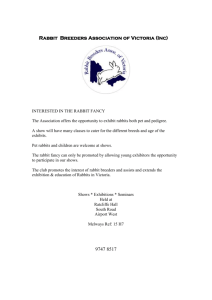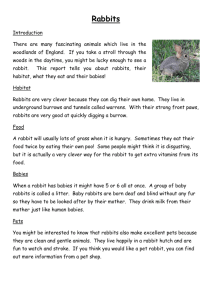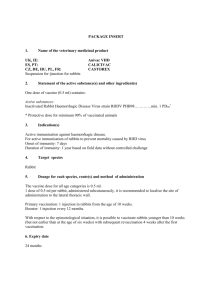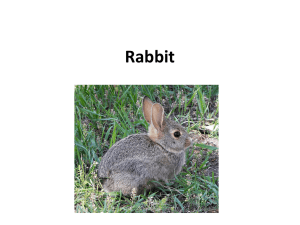Rabbits (accessible version) [MS Word Document
advertisement
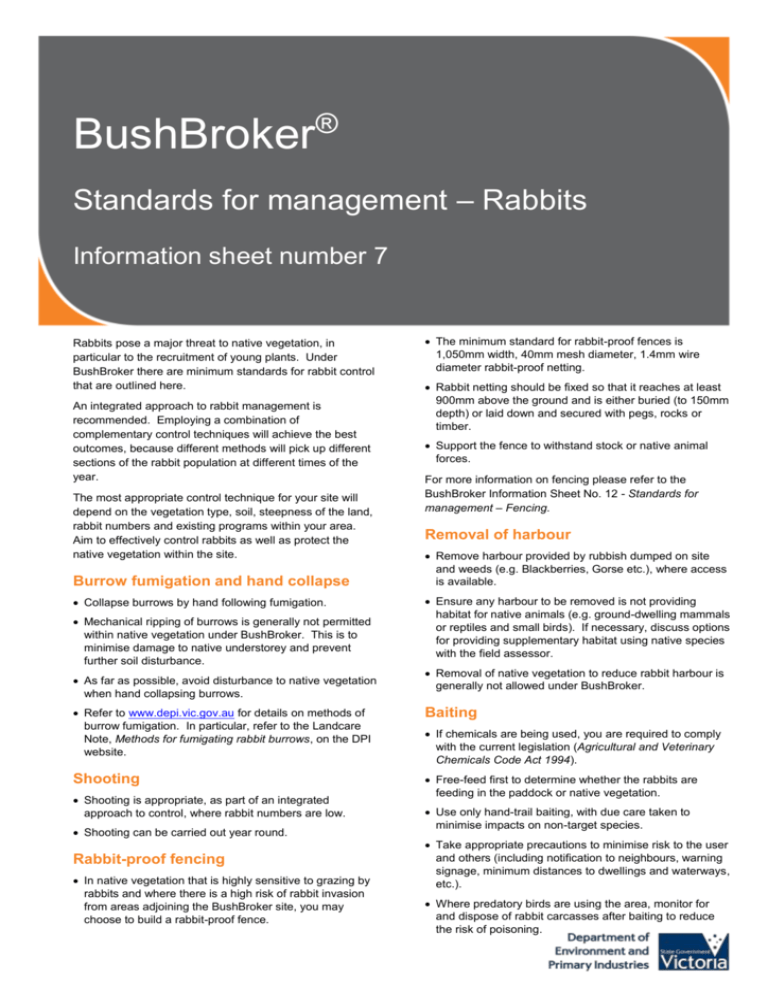
BushBroker® Standards for management – Rabbits Information sheet number 7 Rabbits pose a major threat to native vegetation, in particular to the recruitment of young plants. Under BushBroker there are minimum standards for rabbit control that are outlined here. An integrated approach to rabbit management is recommended. Employing a combination of complementary control techniques will achieve the best outcomes, because different methods will pick up different sections of the rabbit population at different times of the year. The most appropriate control technique for your site will depend on the vegetation type, soil, steepness of the land, rabbit numbers and existing programs within your area. Aim to effectively control rabbits as well as protect the native vegetation within the site. Burrow fumigation and hand collapse Collapse burrows by hand following fumigation. Mechanical ripping of burrows is generally not permitted within native vegetation under BushBroker. This is to minimise damage to native understorey and prevent further soil disturbance. As far as possible, avoid disturbance to native vegetation when hand collapsing burrows. The minimum standard for rabbit-proof fences is 1,050mm width, 40mm mesh diameter, 1.4mm wire diameter rabbit-proof netting. Rabbit netting should be fixed so that it reaches at least 900mm above the ground and is either buried (to 150mm depth) or laid down and secured with pegs, rocks or timber. Support the fence to withstand stock or native animal forces. For more information on fencing please refer to the BushBroker Information Sheet No. 12 - Standards for management – Fencing. Removal of harbour Remove harbour provided by rubbish dumped on site and weeds (e.g. Blackberries, Gorse etc.), where access is available. Ensure any harbour to be removed is not providing habitat for native animals (e.g. ground-dwelling mammals or reptiles and small birds). If necessary, discuss options for providing supplementary habitat using native species with the field assessor. Removal of native vegetation to reduce rabbit harbour is generally not allowed under BushBroker. Refer to www.depi.vic.gov.au for details on methods of burrow fumigation. In particular, refer to the Landcare Note, Methods for fumigating rabbit burrows, on the DPI website. Baiting Shooting Free-feed first to determine whether the rabbits are feeding in the paddock or native vegetation. Shooting is appropriate, as part of an integrated approach to control, where rabbit numbers are low. Shooting can be carried out year round. Rabbit-proof fencing In native vegetation that is highly sensitive to grazing by rabbits and where there is a high risk of rabbit invasion from areas adjoining the BushBroker site, you may choose to build a rabbit-proof fence. If chemicals are being used, you are required to comply with the current legislation (Agricultural and Veterinary Chemicals Code Act 1994). Use only hand-trail baiting, with due care taken to minimise impacts on non-target species. Take appropriate precautions to minimise risk to the user and others (including notification to neighbours, warning signage, minimum distances to dwellings and waterways, etc.). Where predatory birds are using the area, monitor for and dispose of rabbit carcasses after baiting to reduce the risk of poisoning. Rabbits Health and safety You are responsible for ensuring all works required in implementing the management actions are conducted in a safe manner and comply with the lawful requirements of any Authority, and with all Acts, regulations and other laws which may be applicable to the Landowner Agreement. To determine whether there are any underground pipes or cables on your property, you may wish to consider calling 1100 - “Dial before you dig”. This is a free referral service from anywhere in Australia. Further information For further information on BushBroker, please contact the Department of Environment and Primary Industries Customer Service Centre on 136 186 or visit the DEPI website at: www.depi.vic.gov.au/bushbroker. All BushBroker Information Sheets are available on the website. Published by the Victorian Government Department of Environment and Primary Industries Melbourne, October 2013 © The State of Victoria Department of Environment and Primary Industries Melbourne 2013 This publication is copyright. No part may be reproduced by any process except in accordance with the provisions of the Copyright Act 1968. Accessibility If you would like to receive this publication in an alternative format, please telephone DEPI Customer Service Centre 136 186, email customer.service@depi.vic.gov.au (or relevant address), via the National Relay Service on 133 677 www.relayservice.com.au This document is also available in on the internet at www.depi.vic.gov.au Disclaimer ISBN 978-1-74287-692-4 (online – set) www.depi.vic.gov.au This publication may be of assistance to you but the State of Victoria and its employees do not guarantee that the publication is without flaw of any kind or is wholly appropriate for your particular purposes and therefore disclaims all liability for any error, loss or other consequence which may arise from you relying on any information in this publication.
